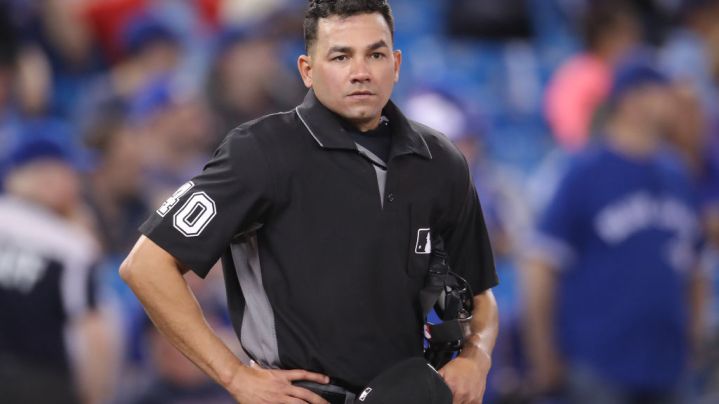Roberto Ortiz Becomes First Full-Time Puerto Rican-Born Umpire in MLB History

TORONTO, ON - MAY 22: Home plate umpire Roberto Ortiz #40 looks on during the Toronto Blue Jays MLB game against the Boston Red Sox at Rogers Centre on May 22, 2019 in Toronto, Canada. (Photo by Tom Szczerbowski/Getty Images)
Roberto Ortiz has become the first Puerto Rican-born umpire to join Major League Baseball (MLB) on a full-time basis.
“I am honored and blessed to have the privilege of becoming the first Puerto Rican umpire to be hired by MLB,” Ortiz said. “It fills me with pride to be able to represent my family and my island of Puerto Rico in what I consider the best league in the world.”
According to the MLB, Ortiz has worked in the league since 2016 as a call-up ump and has 411 under his belt. Before the MLB, he was a minor league umpire for seven years and was assigned to take the field for Triple-A games in 2021.
Also announced late last week was the promotion of Cuban American umpire Laz Diaz to MLB crew chief. He joins Alfonso Marquez as the second MLB crew chief with a Latine background. Marquez is originally from Zacatecas, Mexico.
According to Our Esquina, the addition of Ortiz means that the MLB crew now employs umpires from five different countries or regions in Latin America. They are Puerto Rico, Dominican Republic, Cuba, Venezuela, and Mexico.
Roberto Ortiz added, “We worked very hard for this. Thank God we achieved it and are able to put the first Puerto Rican umpire in the big leagues.”
In 2020, the MLB made history when it named Ramon de Jesus the first Dominican Republic-born umpire to serve in a full-time capacity.
A study last year conducted by Claremont McKenna College suggested that “umpires are granting thousands more strike calls to white pitchers, and thousands fewer to non-white, specifically Black and Hispanic, players.”